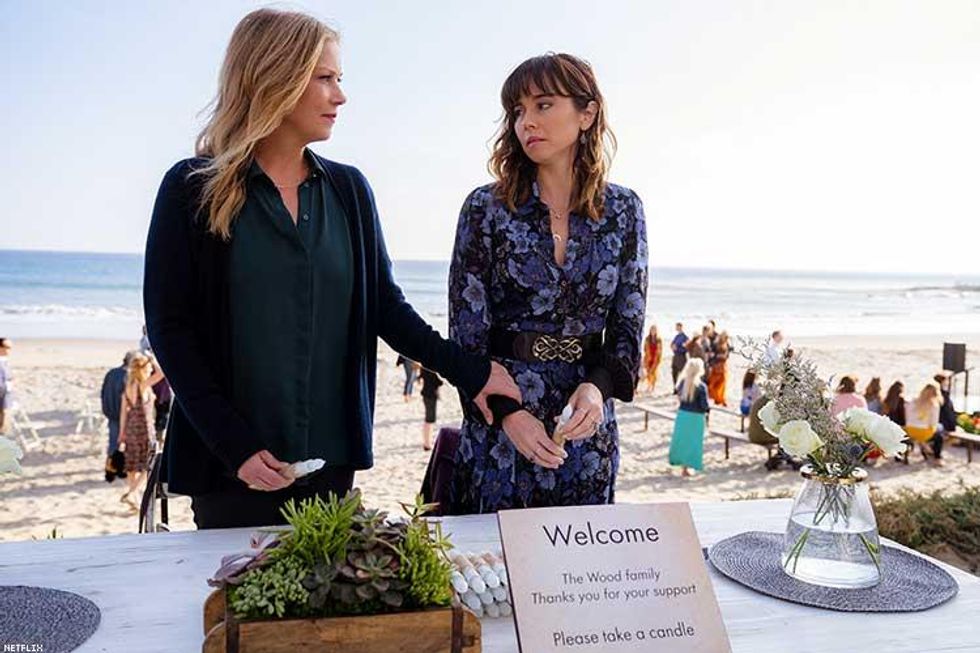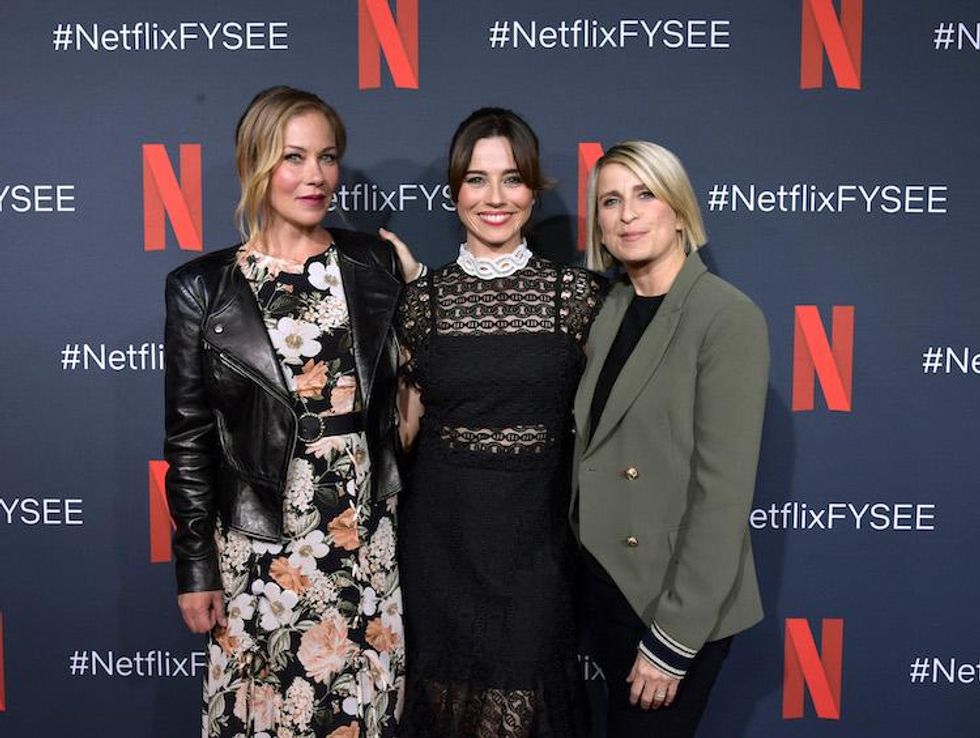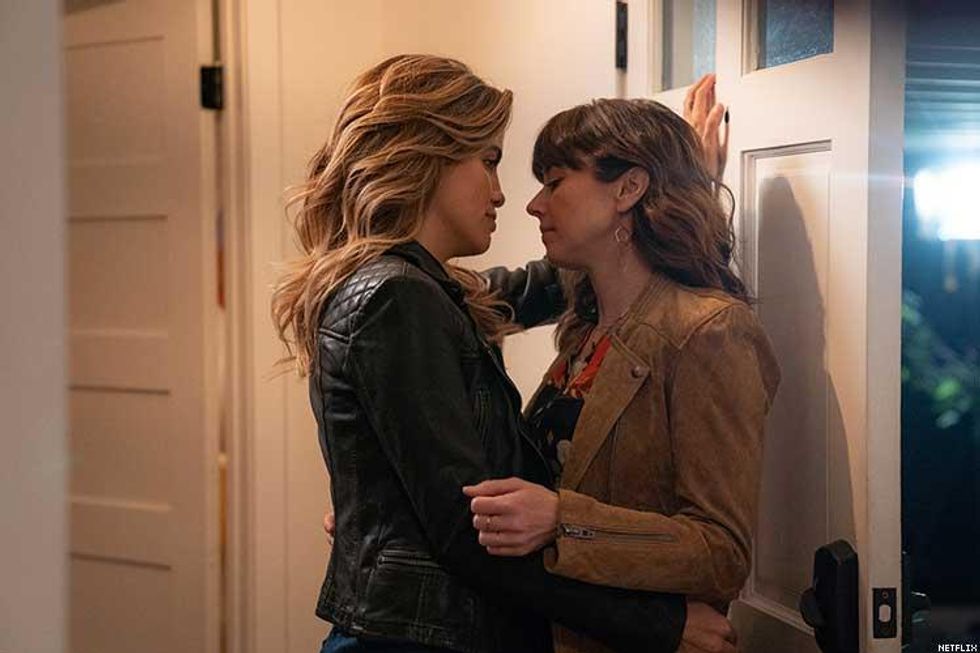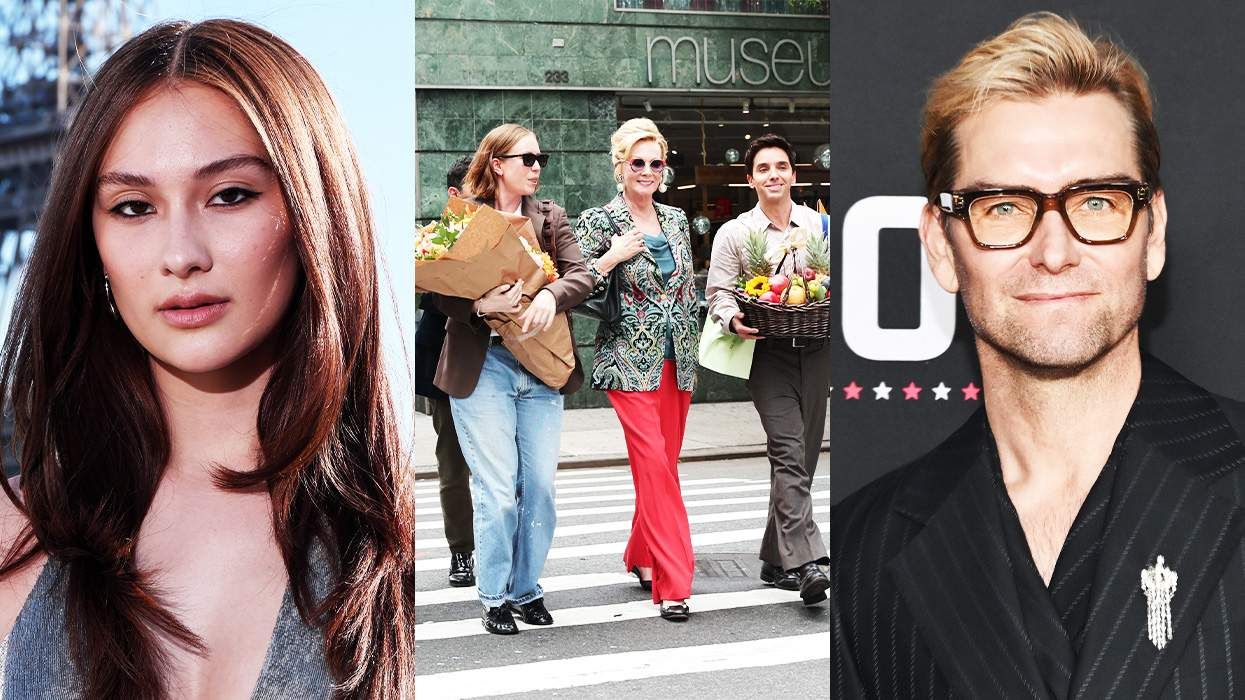During the second season of the Netflix breakout series Dead to Me, Judy, one of the lead characters, finds herself attracted to another woman and pursues it. It's a lovely if not unsurprising extension of the openhearted character played by Linda Cardellini, who is a persistent foil and erstwhile best friend to Christina Applegate's fractious and wonderfully foulmouthed Jen.
Judy shares clear chemistry with her love interest, Michelle (Natalie Morales), and they're good together. Still, Judy and Jen's relationship has resonated wildly with queer female fans since Dead to Me premiered. It is indisputably the show's central love story. And that's the way out creator Liz Feldman conceived of it -- as a love letter to female friendship.
"With this story, I was longing to reflect the story from my own life that I hadn't yet been able to explore. And that is my incredible friendships with women," Feldman tells The Advocate. "I do think, and I have experienced, that there is a kind of romance in a close friendship."
It wasn't long after the series premiered in 2019 that queer women (primarily) took to social media en masse to declare their love for Judy and Jen's energy together and to long for eventual coupledom (in pop culture vernacular, queer women "shipped" them by wishing they were in a relationship). That response was validation that Feldman's ode to friendships between women had hit the mark.
After all, Judy and Jen do become a couple in so many ways via their shared experience and a certain emotional intimacy. Beginning with the series pilot, they drink together, talk endlessly on slumberless nights, and binge reruns of The Facts of Life with Jen proudly proclaiming, "I'm a Jo." Eventually, Judy moves in with Jen and becomes a de facto second parent to Jen's sons who are mourning the loss of their dad, a victim of a hit-and-run.
Feldman, a writer on The Ellen DeGeneres Show and Two Broke Girls for years, says she gets that Judy and Jen may resonate for women-loving women on a different wavelength.
"I understand, appreciate, and love queer relationships between women. Being in one myself for 11 years and just growing up as a gay person, I really love to see them on-screen," Feldman says. "I get excited when they're done well. I completely understand the appetite for it and the need for it."
"It is intimate and it is exciting, but it is not ultimately about sex or physical intimacy, in that way," she adds about the relationship between her leads. "So I understand very much why people would ship Jen and Judy, but the story that I'm really trying to tell is more about how beautiful and intimate friendship can be."
"I take it as a compliment that people ship them," she says.
Christina Applegate and Linda Cardellini
Dead to Me's narrative, which draws Jen and Judy together via grief, facilitates that intimacy. Jen's husband died violently, leaving her to pick up the pieces with her sons, and Judy has suffered immeasurable trauma, although she lies about what that is at first. The story is equal parts high drama and searing wit. But a mystery also emerges soon after the women encounter one another at a grief counseling group overlooking the bluffs of Laguna Beach, Calif.
It turns out that their running into each other and their eventual friendship is no accident. But it's of Judy's making over her guilt for being the person behind the wheel of the car that hit Jen's husband. Later, via flashbacks, it comes out that Jen's fiance, Steve (James Marsden), ordered her to leave the scene of the crime.
By the close of the first season, beyond the trimmed hedges of the cloistered Laguna Beach suburbs, Judy and Jen engage in shared secrets, lies, murder, cover-ups, and bottles upon bottles of wine. They also arrive at the realization that the men in their lives were toxic, as Jen's husband is revealed to have been flagrantly cheating, and Steve, a rager and a narcissist, was in over his head with the Greek mob. In a turn of Highsmith-inspired quid pro quo, Jen whacks Steve in the head with a rock when he shows up at her house demanding to see Judy. Thus, the women kill the toxic man in the other's life.
The murder swap, reminiscent of the deal made in Strangers on a Train, binds Judy and Jen together even deeper via the intimacy of shared crimes and cover-ups.
Feldman shares that while the writers were breaking story on the show's first season, writer Kate Robin elucidated on how the murder swap served to enhance the characters and to deepen their connection.
"I think what we're really doing here is telling the story about two women who come into each other's lives to help each other get rid of the man who is holding them both back from being the best version of themselves" was Robin's thought, Feldman says.
"I was like, 'Oh, my God, that's it!' It's interesting. Sometimes the theme or the motif of the season can present itself in that way," Feldman recalls.
Applegate, Cardellini, Liz Feldman (Getty Images)
While Judy and Jen's unbreakable bond is at the core of the series, Feldman also wrote in an overtly queer relationship for Judy, who begins to date Michelle (Natalie Morales), a woman whose mom becomes a resident at the facility where Judy works. The story highlights Judy's openness to love and her fluid nature while also serving the story through Jen's unquestioning support of the pairing.
"I knew that I wanted Judy to be somebody who could and does love people for who they are. And I was interested in telling a queer love story that defied some of the kinds of classic tropes that we so often see," Feldman says. "Because I've been able to tell stories for so many years, I've told the coming-out story. I've had the opportunity to explore in lots of different queer narratives."
"One I hadn't explored and hadn't ever seen was just a story about two people getting into a relationship together because they were attracted to each other and they liked each other. And that there's no need to comment on it or for Judy as a character we already know and love to sit down with her best friend and say, 'Hey, look, I have something to tell you. I'm dating a woman.'"
"I was interested in telling a queer story that was just a story about queer people and not about them being queer," Feldman adds. "They're just people who are interested in each other, and it's a fun love story until it isn't. Because being gay is so normal and just what life is to me, I was interested in presenting that on-screen."
Natalie Morales, Cardellini
Dead to Me's narrative, which swings from deft comedy to peeling back the layers of trauma, holds a singular space in the TV landscape, one born out of Feldman's seed for the story and the writers' room. But no one, not even Feldman, could have predicted the depth Applegate and Cardellini would bring to their roles. She surmises that their alchemy is part of the reason Judy and Jen feel like a queer couple to many.
"I think it has a lot to do with the fact that Christina Applegate and Linda Cardellini just have really incredible chemistry together," Feldman says. "The compassion and the respect and the love that I think the actresses have for each other in real life just burst onto that screen and therefore exists between those two characters. We are able to really bring this friendship to life in a way that feels really real to people, which is just the ultimate goal."



















Charlie Kirk DID say stoning gay people was the 'perfect law' — and these other heinous quotes
These are some of his worst comments about LGBTQ+ people made by Charlie Kirk.